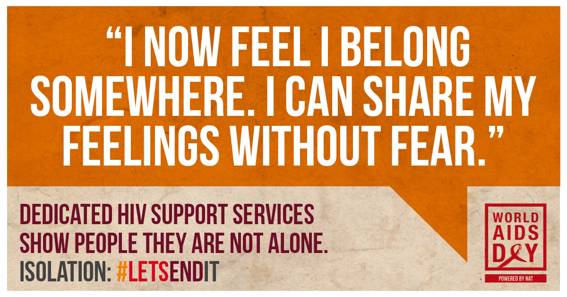World AIDS Day 2017 – Let’s End It: Isolation

from
Recon News
10 December 2017
The theme for World AIDS Day 2017 is 'Let's End It'. End stigma, end HIV transmission and end the isolation experienced by people living with HIV. This post focuses on isolation.
HIV is classified as a disability from the point of diagnosis under the Equality Act 2010. Over 100,000 people are living with HIV in the UK, with approximately 13,500 who don't know they have the virus. Many people living with HIV experience prejudice, discrimination and fear of their status being disclosed, as a result of stigma, with their wellbeing seriously affected by isolation and marginalisation.
Because of treatment, we are now also seeing the first generation of people who are ageing with HIV, with evidence suggesting they are likely to experience chronic loneliness. A third of people living with HIV aged 50 and over are socially isolated, and 82 per cent of over 50s living with HIV experience moderate to high levels of loneliness. People aged over 50 living with HIV are at least three times more likely to experience high levels of loneliness than the general population.
For many people living with HIV the experience and the fear of stigma will contribute more than the physical impact of the virus to social exclusion, isolation and loneliness. This can include an effect on family relationships, sexual relationships, friendships and support networks, including difficulty in forging new relationships. Health conditions associated with HIV can also make getting out and about more difficult.
The closure of vital HIV support services can further add to the isolation of people living with HIV, who need access to help. NAT exposed an alarming trend for cutting HIV support services across England and Wales and have campaigned to stop these important services being cut. HIV support services equip people living with HIV to live well and deal with issues which disproportionately affect them, including stigma, poverty, and poor mental health, social isolation.
In order to reduce poverty, NAT convinced the Government to change how they interview people who need benefits because people living with people HIV have symptoms that vary from day to day. We need to end the link between HIV and poverty: we know having HIV means you are more likely to live in poverty, now we must tackle the causes of poverty.
We need to end seeing the virus not the person: we need to ensure that support is provided for all people with HIV to live full and happy lives.
You can help support NAT's vital work and show your support by donating to NAT and adding a virtual red ribbon to your Recon profile.
SHARE

